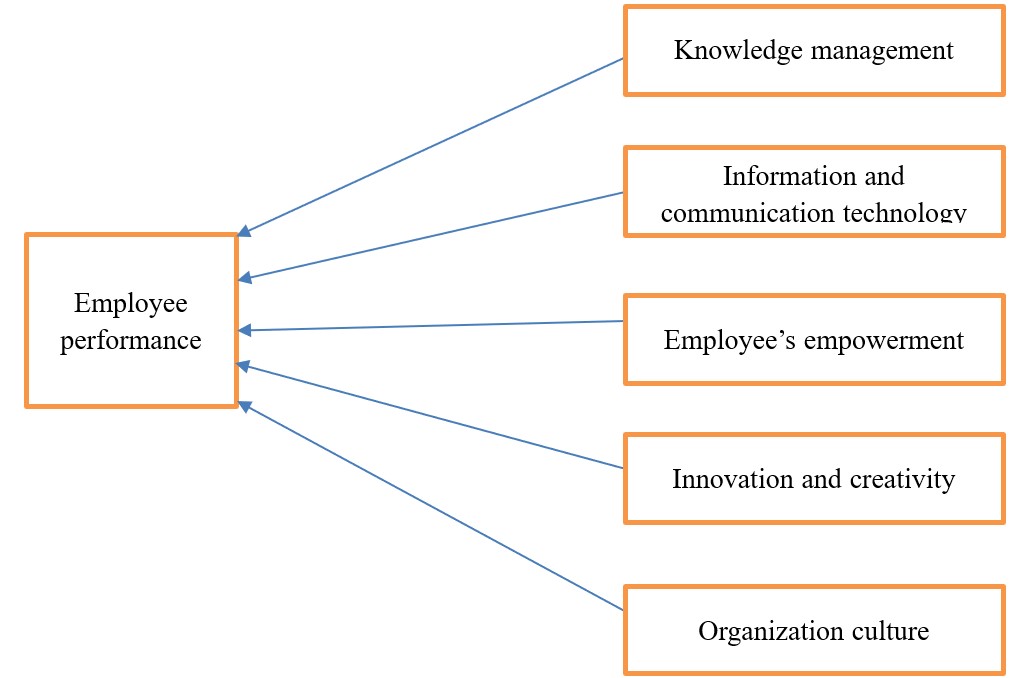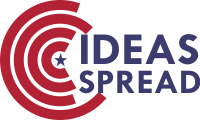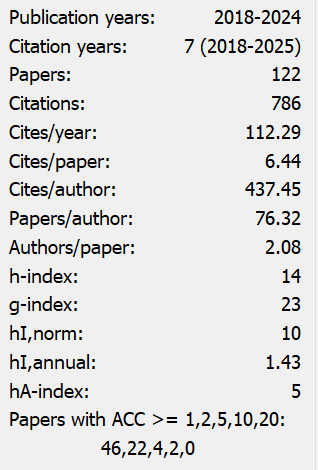The Determinants of Employee’s Performance: A Literature Review
Abstract
This piece of research highlights a contextual understanding of employee performance’s concept by identifying factors affecting employee performance in the organization. This achieved through analyzing literature in ISI (Web of Knowledge) from 2015 until 2019, after that determine factors influencing employee performance. The definition of employee performance is given, furthermore, the description of each factor which has an influence on employee performance. The result indicates that knowledge management, information and communication technology, employee’s empowerment, innovation and creativity and organization culture have a significant impact on employee performance. On the other hand, the correlation between these factors has a vital role in maintaining employee’s performance and attitude.
References
Abualoush, S. H., Masa’deh, R., Bataineh, K., & Alrowwad, A. (2018). The role of knowledge management process and intellectual capital as intermediary variables between knowledge management infrastructure and organization performance. Interdisciplinary Journal of Information, Knowledge, and Management, 13, 279-309. https://doi.org/10.28945/4088
Ahbabi, S. A., Singh, S. K., Balasubramanian, S., & Gaur, S. S. (2019). Employee perception of impact of knowledge management processes on public sector performance. Journal of Knowledge Management, 23, 351-373. https://doi.org/10.1108/JKM-08-2017-0348
Al-Ababneh, M., Al-Sabi, S., Al-Shakhsheer, F., & Masadeh, M. (2017). The Influence of Employee Empowerment on Employee Job Satisfaction in Five-Star Hotels in Jordan. International Business Research, 10(3), 133-147. https://doi.org/10.5539/ibr.v10n3p133
Al-Abdullat, B. M., & Dababneh, A. (2018). The mediating effect of job satisfaction on the relationship between organizational culture and knowledge management in Jordanian banking sector. Benchmarking: An International Journal, 25(2), 517-544. https://doi.org/10.1108/BIJ-06-2016-0081
Alazzaz, F., & Whyte, A. (2015). Linking employee empowerment with productivity in off-site construction. Engineering, Construction and Architectural Management, 22(1), 21-37. https://doi.org/10.1108/ECAM-09-2013-0083
Aldaihani, S. G. (2019). Administrative empowerment among Kuwait University staff and its effect on their job satisfaction. Journal of Applied Research in Higher Education, 1-20. https://doi.org/10.1108/JARHE-02-2019-0027
Ali, A. A., Selvam, D. D., Paris, L., & Gunasekaran, A. (2019). Key factors influencing knowledge sharing practices and its relationship with organizational performance within the oil and gas industry. Journal of Knowledge Management, 1-32.
Alzghoul, A., Elrehail, H., Emeagwali, O. L., & AlShboul, M. K. (2018). Knowledge management, workplace climate, creativity and performance: The role of authentic leadership. Journal of Workplace Learning, 30(8), 592-612. https://doi.org/10.1108/JWL-12-2017-0111
Ardolino, M., Rapaccini, M., Saccani, N., Gaiardelli, P., Crespi, G., & Ruggeri, C. (2018). The role of digital technologies for the service transformation of industrial companies. International Journal of Production Research, 56(6), 2116-2132. https://doi.org/10.1080/00207543.2017.1324224
Armstrong, M. (2016). handbook of strategic human resource management. london: Kogan Page.
Asiaei, K., & Bontis, N. (2019). Translating knowledge management into performance: the role of performance measurement systems. Management Research Review, 33, 1-20. https://doi.org/10.1108/MRR-10-2018-0395
Ax, C., & Greve, J. (2017). Adoption of management accounting innovations: Organizational culture compatibility and perceived outcomes. Management Accounting Research, 34, 59-74. https://doi.org/10.1016/j.mar.2016.07.007
Ayesha, I., & Yadav, R. S. (2019). Human resource information systems: a strategic contribution to HRM. Strategic Direction, 35(10), 4-6. https://doi.org/10.1108/SD-02-2019-0043
Baird, K., Su, S., & Munir, R. (2018). The relationship between the enabling use of controls, employee empowerment, and performance. Rahat Munir, 47(1), 257-274. https://doi.org/10.1108/PR-12-2016-0324
Bataineh, K. A. (2017). The Impact of Electronic Management on the Employees' Performance. Journal of Management and Strategy, 8(5), 86-100. https://doi.org/10.5430/jms.v8n5p86
Batarlienė, N., Čižiūnienė, K., Vaičiūtė, K., Šapalaitė, I., & Jarašūnienė, A. (2017). The Impact of Human Resource Management on the Competitiveness of Transport Companies. Procedia Engineering, 87, 110-116. https://doi.org/10.1016/j.proeng.2017.04.356
Caputo, F., Cillo, V., Candelo, E., & Liu, Y. (2019). Innovating through digital revolution: The role of soft skills and Big Data in increasing firm performance. Management Decision, 57(8), 2032-2051. https://doi.org/10.1108/MD-07-2018-0833
Cardy, R. L., & Miller, J. S. (2005). eHR and Performance Management. THE PROFESSIONAL PRACTICE SERIES. San Francisco: Calif : Jossey-Bass.
Chaubey, A., & Sahoo, C. K. (2019). Enhancing organizational innovation in Indian automobile industry. International Journal of Innovation Science, 11(1), 82-101. https://doi.org/10.1108/IJIS-02-2018-0022
Cooper, D. J., & Ezzamel, M. (2013). Globalization discourses and performance measurementsystems in a multinational firm. Accounting, Organizations and Society, 38, 288-313. https://doi.org/10.1016/j.aos.2013.04.002
Dahiya, D., & Mathew, S. K. (2018). IT infrastructure capability and eGovernment system performance: an empirical study. Transforming Government: People, Process and Policy, 12, 16-38. https://doi.org/10.1108/TG-07-2017-0038
de Menezes, L. M., & Escrig, A. B. (2019). Managing performance in quality management A two-level study of employee perceptions and workplace performance. International Journal of Operations & Production Management, 39(11), 1226-1259. https://doi.org/10.1108/IJOPM-03-2019-0207
Ebrahimi, P., Shafiee, B., Gholampour, A., & Yousefi, L. (2018). Impact of Organizational Innovation, Learning Orientation and Entrepreneurship on SME Performance: The Moderating Role of Market Turbulence and ICT. In D. Khajeheian, M. Friedrichsen, & W. Modinger, Competitiveness in Emerging Markets (pp. 447-480). 0: Springer, Cham. https://doi.org/10.1007/978-3-319-71722-7_23
Flevy Lasrado. (2019). Fostering Creativity and Innovation. Dubai, United Arab Emirates: Palgrave Macmillan, Cham. Retrieved from https://doi.org/10.1007/978-3-319-99121-4
García-Juan, B., Escrig-Tena, A. B., & Roca-Puig, V. (2019). The empowerment–organizational performance link in local governments. Personnel Review, 48(1), 118-140. https://doi.org/10.1108/PR-09-2017-0273
Giotopoulos, I., Kontolaimou, A., Korra, E., & Tsakanikas, A. (2017). What drives ICT adoption by SMEs? Evidence from a large-scale survey in Greece. Journal of Business Research, 81, 60-69. https://doi.org/10.1016/j.jbusres.2017.08.007
Glaister, A. J., Karacay, G., Demirbag, M., & Tatoglu, E. (2018). HRM and performance - The role of talent management as a transmission mechanism in an emerging market context. Human Resource Management Journal, 148-166. https://doi.org/10.1111/1748-8583.12170
Gunjal, B. (2019). Knowledge Management: Why Do We Need it for Corporates. Malaysian Journal of Library & Information Science, 10, 37-50. https://doi.org/10.31229/osf.io/fy984
Hughes, D. J., Lee, A., Tian, A. W., Newman, A., & Legood, A. (2018). Leadership, creativity, and innovation: A critical review and practical recommendations. The Leadership Quarterly, 29, 549-569. https://doi.org/10.1016/j.leaqua.2018.03.001
Hwang, Y., Lin, H., & Shin, D. (2018). Knowledge system commitment and knowledge sharing intention: The role of personal information management motivation. International Journal of Information Management, 39, 220-227. https://doi.org/10.1016/j.ijinfomgt.2017.12.009
Imran, M. K., Ilyas, M., Aslam, U., & Fatima, T. (2018). Knowledge processes and firm performance: the mediating effect of employee creativity. Journal of Organizational Change Management, 31, 512-553. https://doi.org/10.1108/JOCM-10-2016-0202
Iqbal, A., Latif, F., Marimon, F., Sahibzada, U. F., & Hussain, S. (2019). From knowledge management to organizational performance Modelling the mediating role of innovation and intellectual capital in higher education. Journal of Enterprise Information Management, 32(1), 36-59. https://doi.org/10.1108/JEIM-04-2018-0083
Isaac, O., Abdullah, Z., Ramayah, T., & Mutahar, A. M. (2017). Internet usage, user satisfaction,task-technology fit, and performance impact among public sector employees in Yemen. The International Journal of Information and Learning Technology, 34, 210-241. https://doi.org/10.1108/IJILT-11-2016-0051
Islami, Mulolli, & Mustafa (2018). Using Management by Objectives as a performance appraisal tool for employee satisfaction. Future Business Journal, 4(1), 94-108. https://doi.org/10.1016/j.fbj.2018.01.001
Ismail, H. N., Iqbal, A., & Nasr, L. (2019). Employee engagement and job performance in Lebanon: the mediating role of creativity. International Journal of Productivity and Performance Management, 68(3), 506-523. https://doi.org/10.1108/IJPPM-02-2018-0052
Anitha, J. (2013). Determinants of employee engagement and their impact on employee performance. GRG School of Management Studies, 63, 1741-0401.
Jogaratnam, G. (2017). How organizational culture influences market orientation and business performance in the restaurant industry. Journal of Hospitality and Tourism Management, 31, 211-219. https://doi.org/10.1016/j.jhtm.2017.03.002
Jyoti, J., & Rani, A. (2017). High performance work system and organisational performance: role of knowledge management. Personnel Review, Emerald Publishing Limited, 46, 1770-1795. https://doi.org/10.1108/PR-10-2015-0262
Khalili, A. (2018). Creativity and innovation through LMX and personal initiative. Journal of Organizational Change Management, 31(2), 323-333. https://doi.org/10.1108/JOCM-09-2016-0183
Kim, T., & Chang, J. (2019). Organizational culture and performance: a macro-level longitudinal study. Leadership & Organization Development Journal, 40(1), 65-84. https://doi.org/10.1108/LODJ-08-2018-0291
Kitchenham, B. A., & Charters, S. (2007). Guidelines for performing Systematic Literature Reviews in Software Engineering. UK: Keele University and University of Durham.
Kõiv, K., Liik, K., & Heidmets, M. (2019). School leadership, teacher’s psychological empowerment and work-related outcomes. International Journal of Educational Management, 33(7), 1501-1514. https://doi.org/10.1108/IJEM-08-2018-0232
Kraśnicka, T., Głód, W., & Wronka-Pośpiech, M. (2018). Management innovation, pro-innovation organisational culture and enterprise performance: testing the mediation effect. Review of Managerial Science, 12(3), 737-769. https://doi.org/10.1007/s11846-017-0229-0
Kremer, H., Villamor, I., & Aguinis, H. (2019). Innovation leadership: Best-practice recommendations for promoting employee creativity, voice, and knowledge sharing. Business Horizons, 62(1), 65-74. https://doi.org/10.1016/j.bushor.2018.08.010
Kundu, S. C., Kumar, S., & Gahlawat, N. (2019). Empowering leadership and job performance: mediating role of psychological empowerment. Management Research Review, 42(5), 605-624. https://doi.org/10.1108/MRR-04-2018-0183
Laar, E. v., Deursen, A. J., Dijk, J. A., & Haan, J. d. (2019). Twenty-first century digital skills for the creative industries workforce: Perspectives from industry experts. First Monday, 24(1), 1-7.
Larentis, F., Antonello, C. S., & Slongo, L. A. (2019). Development of Inter-organizational Culture: The Elements. In F. Larentis, C. S. Antonello, & L. A. Slongo, Inter-Organizational Culture (pp. 27-46). Palgrave Pivot, Cham. https://doi.org/10.1007/978-3-030-00392-0_3
Lewis, R. L., Brown, D. A., & Sutton, N. C. (2019). Control and empowerment as an organising paradox: implications for management control systems. Accounting, Auditing & Accountability Journal, 32(2), 483-507. https://doi.org/10.1108/AAAJ-11-2017-3223
Mahadevan, K. (2017). Culture driven regeneration (CDR): a conceptual business improvement tool. The TQM Journal, 29(2), 403-420. https://doi.org/10.1108/TQM-05-2015-0061
Melián-González, S., & Bulchand-Gidumal, J. (2017). Information technology and front office employees’ performance. International Journal of Contemporary Hospitality Management, 29, 2159-2177. https://doi.org/10.1108/IJCHM-10-2015-0585
Mensah, J. K. (2018). Talent Management and Employee Outcomes: A Psychological Contract Fulfilment Perspective. Springer Science+Business Media, 19, 325-344. https://doi.org/10.1007/s11115-018-0407-9
Nayak, T., Sahoo, C. K., & Mohanty, P. K. (2018). Workplace empowerment, quality of work life and employee commitment: a study on Indian healthcare sector. Journal of Asia Business Studies, 12(2), 117-136. https://doi.org/10.1108/JABS-03-2016-0045
Ndou, V., Schiuma, G., & Passiante, G. (2019). Towards a framework for measuring creative economy: evidence from Balkan countries. Measuring Business Excellence, 23(1), 41-62. https://doi.org/10.1108/MBE-03-2018-0013
Nesan, L. J., & Holt, G. D. (2002). Assessment of organisational involvement in implementing empowerment. Integrated Manufacturing Systems, 201-211. https://doi.org/10.1108/09576060210426903
Nguyen, T. H., & Le, A. N. H. (2019). Promoting creativity and innovation: expected and unexpected consequences. Asia Pacific Journal of Innovation and Entrepreneurship, 1-15. https://doi.org/10.1108/APJIE-03-2019-0008
Nikpour, A. (2017). The Impact of Organizational Culture on Organizational Performance: The Mediating Role of Employee’s Organizational Commitment. International Journal of Organizational Leadership, 6(3), 65-72. https://doi.org/10.33844/ijol.2017.60432
Obeidat, S. M. (2016). The link between e-HRM use and HRM effectiveness: an empirical study. Personnel Review, 45(6), 1281-1301. https://doi.org/10.1108/PR-04-2015-0111
Olsson, A., Paredes, K. M., Johansson, U., Roese, M. O., & Ritzén, S. (2019). Organizational climate for innovation and creativity - a study in Swedish retail organizations. The International Review of Retail, Distribution and Consumer Research, 3, 243-261. https://doi.org/10.1080/09593969.2019.1598470
Pawirosumarto, S., Sarjana, P. K., & Gunawan, R. (2017). The effect of work environment,leadership style, and organizational culture towards job satisfaction and its implication towards employee performance in Parador Hotels and Resorts, Indonesia. International Journal of Law and, 59(6), 1337-1358. https://doi.org/10.1108/IJLMA-10-2016-0085
Potnuru, R. K., Sahoo, C. K., & Sharma, R. (2019). Team building, employee empowerment and employee competencies: Moderating role of organizational learning culture. European Journal of Training and Development, 43, 39-60. https://doi.org/10.1108/EJTD-08-2018-0086
Rahman, M., Mordi, C., & Nwagbara, U. (2018). Factors influencing E-HRM implementation in government organisations: Case studies from Bangladesh. Journal of Enterprise Information Management, 31(2), 247-275. https://doi.org/10.1108/JEIM-05-2017-0066
Ramdhani, A., Ramdhani, M. A., & Ainisyifa, H. (2017). Conceptual Framework of Corporate Culture Influenced on Employees Commitment to Organization. International Business Management, 11(3), 826-830. https://doi.org/10.36478/ibm.2017.826.830
Reichstein, C. (2019). Strategic IT management: How companies can benefit from an increasing IT influence. Journal of Enterprise Information Management, 32(2), 251-273. https://doi.org/10.1108/JEIM-08-2018-0172
Revilla, E., & Rodríguez-Prado, B. (2018). Bulding ambidexterity through creativity mechanisms: Contextual drivers of innovation success. Research Policy, 47(9), 1611-1625. https://doi.org/10.1016/j.respol.2018.05.009
Rich, L. L., Rich, J., & Hair, J. (2018). The influence of organizational culture on how we define and pursue goals: The value of regulatory focus. Journal of Organizational Effectiveness: People and Performance, 5(3), 259-277. https://doi.org/10.1108/JOEPP-03-2018-0017
Rouhani, S., & Mehri, M. (2018). Empowering benefits of ERP systems implementation: empirical study of industrial firms. Journal of Systems and Information Technology, 20, 54-72. https://doi.org/10.1108/JSIT-05-2017-0038
Sales, X. (2019). A proposed methodology for evaluating the quality of performance management systems. Pacific Accounting Review, 1-18. https://doi.org/10.1108/PAR-03-2018-0019
Schuckert, M., Kim, T. T., Paek, S., & Lee, G. (2018). Motivate to innovate: How authentic and transformational leaders influence employees’ psychological capital and service innovation behavior. International Journal of Contemporary Hospitality Management, 30(2), 776-796. https://doi.org/10.1108/IJCHM-05-2016-0282
Shah, N., Irani, Z., & Sharif, A. M. (2017). Big data in an HR context: Exploring organizational change readiness. Journal of Business Research, 70, 366-378. https://doi.org/10.1016/j.jbusres.2016.08.010
Shah, T. A., Khattak, M. N., Zolin, R., & Shah, S. Z. (2019). Psychological empowerment and employee attitudinal outcomes: The pivotal role of psychological capital. Management Research Review, 42(7), 797-817. https://doi.org/10.1108/MRR-05-2018-0194
Shahzad, F., Xiu, G., & Shahbaz, M. (2017). Organizational culture and innovation performance in Pakistan's software industry. Technology in Society, 51, 66-73. https://doi.org/10.1016/j.techsoc.2017.08.002
Shehata, G. M., & Montash, M. A. (2019). Driving the internet and e-business technologies to generate a competitive advantage in emerging markets: Evidence from Egypt. Information Technology & People, 1-36. https://doi.org/10.1108/ITP-10-2017-0360
Smith, M., & Bititci, U. S. (2017). Interplay between performance measurement and management, employee engagement and performance. International Journal of Operations, 37(9), 1207-1228. https://doi.org/10.1108/IJOPM-06-2015-0313
Song, Z., Gu, Q., & Wang, B. (2019). Creativity-oriented HRM and organizational creativity in China: A complementary perspective of innovativeness. International Journal of Manpower, 40(5), 834-849. https://doi.org/10.1108/IJM-05-2016-0108
Soto-Acosta, P., Popa, S., & Palacios-Marqués, D. (2016). Social web knowledge sharing and innovation performance in knowledge-intensive manufacturing SMEs. The Journal of Technology Transfer, 42, 425-440. https://doi.org/10.1007/s10961-016-9498-z
Stojcic, N., Hashi, I., & Orlic, E. (2018). Creativity, innovation effectiveness and productive efficiency in the UK. European Journal of Innovation Management, 21(4), 564-580. https://doi.org/10.1108/EJIM-11-2017-0166
Susanty, A. I., Yuningsih, Y., & Anggadwita, G. (2019). Knowledge management practices and innovation performance: A study at Indonesian Government apparatus research and training cente. Journal of Science and Technology Policy Management, 10, 301-318. https://doi.org/10.1108/JSTPM-03-2018-0030
Tabatabaei, S. A., Omran, E. S., Hashemi, S., & Sedaghat, M. (2017). Presenting Sustainable HRM Model Based on Balanced Scorecard in Knowledge-based ICT Companies. Economics and Sociology, 10(2), 107-124. https://doi.org/10.14254/2071-789X.2017/10-2/8
Turulja, L., & Bajgoric, N. (2018). Information technology, knowledge management and human resource management: Investigating mutual interactions towards better organizational performance. VINE Journal of Information and Knowledge Management Systems, 48(2), 255-276. https://doi.org/10.1108/VJIKMS-06-2017-0035
Wang, J., Cheng, G. H. L., Chen, T., & Leung, K. (2019). Team creativity/innovation in culturally diverse teams: A meta-analysis. Journal of Organizational Behavior, 40(6), 693-708. https://doi.org/10.1002/job.2362
Warrick, D. (2017). What leaders need to know about organizational culture. Business Horizons, 60(3), 395-404. https://doi.org/10.1016/j.bushor.2017.01.011
Wu, L. F., Huang, I. C., Huang, W. C., & Du, P. L. (2019). Aligning organizational culture and operations strategy to improve innovation outcomes: An integrated perspective in organizational management. Journal of Organizational Change Management, 323(2), 224-250. https://doi.org/10.1108/JOCM-03-2018-0073
Zaitouni, M., & Ouakouak, M. L. (2018). Key predictors of individual creativity in a Middle Eastern culture: The case of service organizations. International Journal of Organizational Analysis, 26(1), 19-42. https://doi.org/10.1108/IJOA-03-2017-1139
Zhang, Z. (2018). Organizational culture and knowledge sharing: design of incentives and business processes. Business Process Management Journal, 24(2), 384-399. https://doi.org/10.1108/BPMJ-08-2015-0119


This work is licensed under a Creative Commons Attribution 4.0 International License.
Copyright for this article is retained by the author(s), with first publication rights granted to the journal.
This is an open-access article distributed under the terms and conditions of the Creative Commons Attribution license (http://creativecommons.org/licenses/by/4.0/).


























